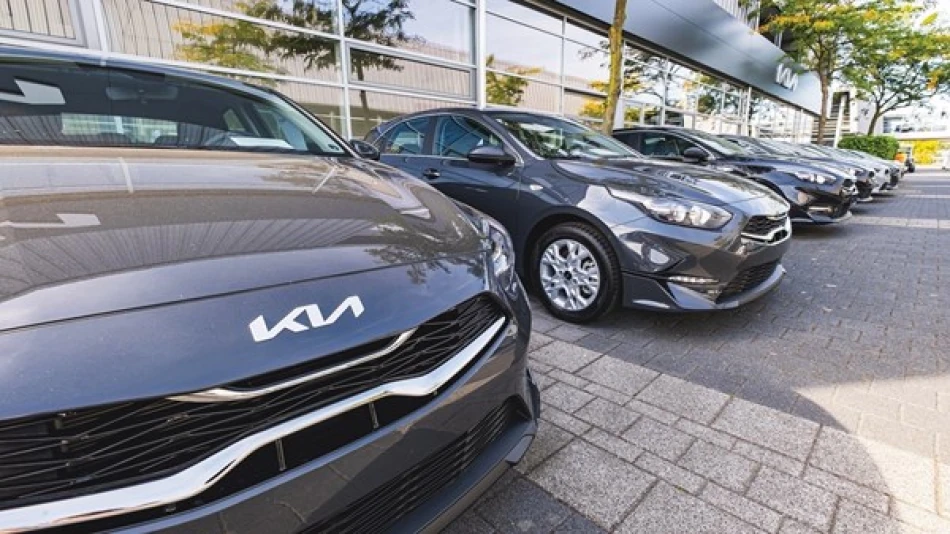
South Korean Auto Exports Surge 8.6% in August
South Korean Auto Exports Surge Despite US Tariffs as Electric Vehicle Demand Powers Growth
South Korean automotive exports climbed 8.6% year-over-year in August to reach $5.5 billion, marking the highest August figure on record despite facing 25% US tariffs. The growth was primarily driven by surging European demand for electric vehicles, with eco-friendly car exports jumping 26.6% as Korean manufacturers capitalize on the global transition to cleaner transportation.
Record-Breaking Performance Amid Trade Headwinds
The August export figures represent a significant achievement for South Korea's automotive sector, which has managed to offset declining North American sales through diversification and product innovation. With cumulative exports from January to August reaching an all-time high of $47.7 billion, Korean automakers are demonstrating remarkable resilience in navigating complex global trade dynamics.
Export volumes also increased by 5.5% to 200,317 vehicles, indicating that growth wasn't merely driven by price increases but genuine demand expansion across multiple markets.
European Markets Drive Electric Vehicle Adoption
Explosive Growth in Key EU Markets
European Union exports surged by an impressive 54% year-over-year to $792 million, with Germany and the Netherlands leading the charge at 118.7% and 110.3% growth respectively. This dramatic increase reflects Europe's aggressive push toward electric vehicle adoption, supported by generous government subsidies and increasingly stringent emissions regulations.
The UK market showed even stronger performance with 115.7% growth reaching $250 million, while Turkey expanded by 96.1% to $100 million. These figures suggest Korean brands like Hyundai and Kia are successfully positioning themselves as premium alternatives to European manufacturers in the EV space.
Strategic Model Success
The global popularity of specific models like the Kia EV3 and Hyundai's Casper electric vehicle (sold as "Inster" internationally) drove electric vehicle shipments up 78.4% to 23,000 units. This targeted approach to developing region-specific electric models appears to be paying dividends in competitive markets.
US Tariff Impact Creates Market Rebalancing
North American shipments declined 8.3% to $2.55 billion, with US exports specifically falling 15.2% to $2.1 billion. The 25% tariffs imposed during the Trump administration continue to weigh on Korean automotive competitiveness in America's crucial market, forcing manufacturers to accelerate their geographic diversification strategies.
This trade tension mirrors similar challenges faced by other Asian manufacturers and highlights the ongoing fragmentation of global automotive supply chains. Korean companies are responding by increasing local production in the US and Mexico while strengthening their position in tariff-free markets.
Broader Regional Expansion Strategy
Beyond Europe, Korean automakers showed solid growth across emerging markets. Asian exports increased 9.3% to $591 million, Middle Eastern markets grew 9.8% to $369 million, and Oceania jumped 20.1% to $344 million. This diversified growth pattern suggests Korean brands are successfully building global market share outside traditional strongholds.
Domestic Market Transformation
The domestic story is equally compelling, with local sales rising 8.3% to 139,000 units, marking seven consecutive months of growth. Most significantly, eco-friendly vehicles now represent more than half of all cars sold in South Korea, with sales surging 36.1% year-over-year.
This domestic transition positions South Korean manufacturers as genuine leaders in the global electric vehicle race, providing them with scale advantages and technological expertise that competitors from traditional automotive powers may struggle to match.
Investment and Manufacturing Implications
Local production increased 7.1% to 321,000 units in August, supported by both export demand and domestic sales growth. This production expansion indicates confidence in sustained demand and suggests continued capital investment in Korean manufacturing capacity.
For investors, these figures signal that Korean automotive companies are successfully navigating the industry's electric transition while building resilient, geographically diversified revenue streams. The combination of technological leadership in EVs, strong brand recognition, and manufacturing efficiency positions them favorably against both traditional automakers and new electric vehicle startups globally.
Most Viewed News

 Layla Al Mansoori
Layla Al Mansoori






